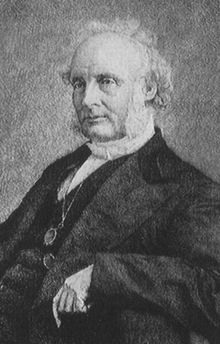James McCosh
(Redirected from McCosh, James)

James McCosh (April 1, 1811 – November 16, 1894) was a prominent philosopher of the Scottish School of Common Sense. He was president of Princeton University (1868–1888).
Sourced[edit]
Dictionary of Burning Words of Brilliant Writers (1895)[edit]
- Quotes reported in Josiah Hotchkiss Gilbert, Dictionary of Burning Words of Brilliant Writers (1895).
- Newton supposed that all matter attracted other matter inversely according to the square of the distance; and the hypothesis was found to account for the whole movements of the heavenly bodies; which all became verifications of what Newton supposed to be the law of the solar system. Adopt the hypothesis that Jesus was what He is represented, and the whole of the books and the history becomes a verification.
- P. 58.
- Our Lord's miracles were all essential parts of His one consistent life. They were wrought as evidences not only of His power, but of His mercy. They were throughout moral in their character, and spiritual in the ends contemplated by them. They were in fact embodiments of His whole character, exemplars of His whole teaching, emblems of His whole mission.
- P. 66.
- When Christianity is received, it stimulates the faculties, and calls forth new ideas, new motives, and new sentiments. It has been the mother of all modern education.
- P. 139.
- As ages roll on there is doubtless a progression in human nature. The intellectual comes to rule the physical, and the moral claims to subordinate both. It is no longer strength of body that prevails, but strength of mind; while the law of God proclaims itself superior to both.
- P. 216.
- True humility is a Christian grace and one of the fruits of the Spirit, originating in a deep consciousness of sin past and present, and leading us to discover our nothingness in the view of God, our insufficiency for any thing that is good, and prompting us, as we feel our infirmities, to strive after higher and yet higher attainments.
- P. 329.
- It is not the motive, properly speaking, that determines the working of the will; but it is the will that imparts strength to the motive. As Coleridge says: " It is the man that makes the motive, and not the motive the man."
- P. 420.
- I hold that we have a very imperfect knowledge of the works of nature till we view them as works of God,— not only as works of mechanism, but works of intelligence, not only as under laws, but under a Lawgiver, wise and good.
- P. 429.
- Pride looks back upon its past deeds, and calculating with nicety what it has done, it commits itself to rest; whereas humility looks to that which is before, and discovering how much ground remains to be trodden, it is active and vigilant. Having gained one height, pride looks down with complacency on that which is beneath it; humility looks up to a higher and yet higher elevation. The one keeps us on this earth, which is congenial to its nature; the other directs our eye, and tends to lift us up to heaven.
- P. 485.
